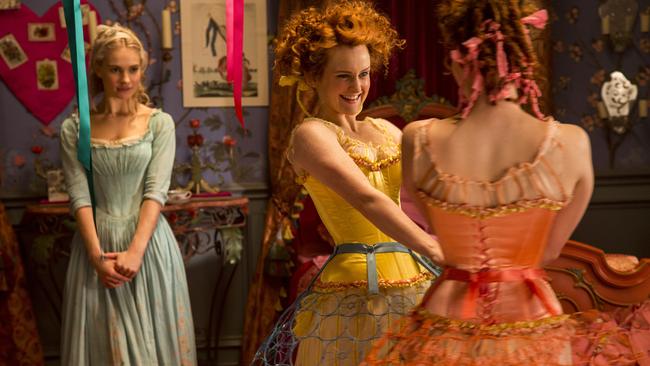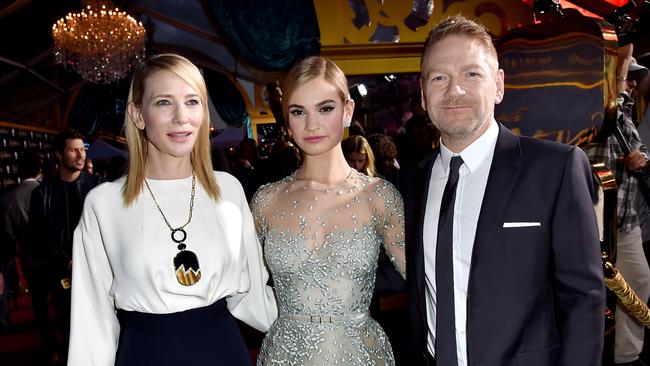Finally, a kick-ass Disney heroine
THE live-action remake of Disney’s Cinderella — directed by Kenneth Branagh — sees the heroine get a modern-day makeover. But will the fans approve?
New Movies
Don't miss out on the headlines from New Movies. Followed categories will be added to My News.
LET it never be said Kenneth Branagh isn’t a man who lives on the edge.
As one of the most prolific Shakespearean actors and directors of our time, he has braved the wrath of the puritans and the weight of 400-odd years of theatrical history.
In taking the reins of the first Thor movie, he was tasked with building one of the foundations of the Marvel Universe, while at the same time running a gauntlet of geeks.
And with his latest death-defying feat — creating a modern-day, live-action version of Disney’s famed fairytale Cinderella — Branagh risked destroying the childhood memories of millions.
LILY JAMES: Cinderella star defends her teen-tiny waist

“I am aware that people have a very personal reaction,” says the Belfast-born Branagh from Los Angeles, the day after Cinderella had its world premiere.
“I know from my experience of the Shakespeares, and then more popularly with Thor for Marvel, that the sense of ownership amongst the fans of the material and the characters is really significant. There are a lot of people with passionately held points of view and they have high expectations.”

As highly as he regarded those passionate fans, Branagh knew going in that Cinderella (the story and the girl) needed a modern makeover: “It is beloved,” he says, “but people, latterly, have been frustrated or perplexed at the way traditional Cinderella appears to be passive or a victim.”
There would be no damsel in distress on his watch.

“It’s not a realistic or helpful message. Out in the world itself, it’s not something that holds water,” he explains. “I also understand amongst actors that it doesn’t hold the same amount of interest to play that kind of role.
“This was an archetypal story where the ability to subtly shift that element was one of the things that attracted me; the fact that you could make a big jump just by saying: in the 21st century we think it’s possible for her to be a different kind of individual.”

While this 21st-century fairytale still has most of the story points we’re familiar with, including a happy ending, the main difference is that Cinderella (played by Downton Abbey’s Lily James) and the Prince (Game of Thrones’ Richard Madden) meet on equal terms. She’s not swooning just because he’s a prince or waiting around for a ticket out of servitude.
We also get to peek inside the Prince’s relationship with his father (played by Derek Jacobi) and learn there are reasons Cate Blanchett’s stepmother earned the descriptor “wicked”.
“One of the reasons she’s so good is she still is determined to try and get it right,” says Branagh of Blanchett. “This feeling of almost doing it for the first time is something that really imparts itself to the younger actors. Literally last night I said to Cate, ‘Thanks ever so much for just leading the company, for being an example in everything that you do’.

“It’s not just that she’s a supreme talent, but the number of effortless moments where I saw her be kind to Lily or Richard … it really had a massive impact.”
Branagh adds that he knew James was going to slay the lead role when he saw her hold her own in a scene where the stepmother discovers Cinderella has been hiding the glass slipper: “Cate’s gonna take no prisoners in that scene and Lily gave as good as she got.”
There is a school of thought that Blanchett and Fairy Godmother Helena Bonham Carter, who happens to be Branagh’s ex-partner, could or should have switched roles. Bonham Branagh says that was never an option (Blanchett was already attached in the stepmother role, therefore “Helena became a natural choice for the Fairy Godmother”) but he does understand this line of thinking.

“We’ve often thought if we took the show on tour, if we do the live version, maybe a fun thing would be for them to exchange roles in a midweek turnaround.”
The live arena is where Branagh made his own name, performing not just Shakespeare but Chekhov and Osborne. That those beginnings have somehow led to Marvel superheroes and Disney princesses leaves even him a little baffled.
“I had a slight out-of-body experience last night as I was driving with my wife up to Hollywood Boulevard, thinking about what my mother once said to me when we were in New York on a trip together before she passed away. She said, ‘My God this is a long way from Belfast’. That’s what I felt last night.

“Even when I was blessed with a sense at 16 that I wanted to act — unusual for someone from my background as it was — the goal was really just to see if I could make a living as an actor somehow, somewhere. Films were a dream, not even something that crossed my mind. To end up in this neck of the woods ... it was definitely a pinch me kind of moment.”
Branagh will be back in more familiar surroundings later this year when his final three Wallander TV movies go to air. He’s been playing the tortured Swedish inspector for the BBC since 2008.
“These last three cover the last book that Henning Mankell wrote on the character called The Troubled Man and a previous novel called The White Lioness which was set in South Africa,” Branagh explains. “I’ve literally just finished those. It was a joy to do and I think the shows go out on a high.”
— Cinderella opens today
Originally published as Finally, a kick-ass Disney heroine






